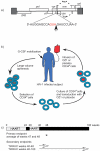Phase 2 gene therapy trial of an anti-HIV ribozyme in autologous CD34+ cells
- PMID: 19219022
- PMCID: PMC2768566
- DOI: 10.1038/nm.1932
Phase 2 gene therapy trial of an anti-HIV ribozyme in autologous CD34+ cells
Abstract
Gene transfer has potential as a once-only treatment that reduces viral load, preserves the immune system and avoids lifetime highly active antiretroviral therapy. This study, which is to our knowledge the first randomized, double-blind, placebo-controlled, phase 2 cell-delivered gene transfer clinical trial, was conducted in 74 HIV-1-infected adults who received a tat-vpr-specific anti-HIV ribozyme (OZ1) or placebo delivered in autologous CD34+ hematopoietic progenitor cells. There were no OZ1-related adverse events. There was no statistically significant difference in viral load between the OZ1 and placebo group at the primary end point (average at weeks 47 and 48), but time-weighted areas under the curve from weeks 40-48 and 40-100 were significantly lower in the OZ1 group. Throughout the 100 weeks, CD4+ lymphocyte counts were higher in the OZ1 group. This study indicates that cell-delivered gene transfer is safe and biologically active in individuals with HIV and can be developed as a conventional therapeutic product.
Trial registration: ClinicalTrials.gov NCT00074997.
Figures






References
-
- Baltimore D. Gene therapy. Intracellular immunization. Nature. 1988;335:395–396. - PubMed
-
- Amado RG, et al. Anti-human immunodeficiency virus hematopoietic progenitor cell-delivered ribozyme in a phase I study: myeloid and lymphoid reconstitution in human immunodeficiency virus type-1-infected patients. Hum Gene Ther. 2004;15:251–62. - PubMed
Publication types
MeSH terms
Substances
Associated data
Grants and funding
LinkOut - more resources
Full Text Sources
Other Literature Sources
Medical
Research Materials

